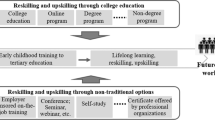Abstract
In this article, we have analysed whether graduates from activating learning environments assess themselves as having more generic and reflective competences than graduates who studied in conventional learning environments. We have also investigated whether graduates from different learning environments look back differently on their training for the workplace. Contrary to earlier research we have used data from a large-scale survey among higher education graduates, the ‘Higher education and Graduate Employment in Europe’ project (CHEERS). The CHEERS-data distinguishes different kind of learning environments and 36 different kind of competencies among more than 1,200 graduates from 12 universities in the Netherlands. Results show that graduates from activating learning environments attribute more generic and reflective competences to themselves than graduates from conventional learning environments. In addition, results indicate that the quality of contents of majors and of curriculum design are significantly related to the presence of generic and reflective competences according to the perception of graduates. Finally, results demonstrate that the competences learning ability, analytic competences, working independently and working in a team positively contribute to the development of competences in the later careers of graduates.
Similar content being viewed by others
References
Aalborg University (2003). Aalborg University Web site “Project-organized education and how to implement it”.
J. Arnold K. Mackenzie Davey (1992) ArticleTitle‘Self-ratings and supervisor ratings of graduate employees’ competences during early career’ Journal of Occupational and Organizational Psychology 65 235–250
A. Bandura (1997) Self-efficacy. The exercise of control W.H. Freeman and Company New York
J.D. Bransford J.J. Franks N.J. Vye R.D. Sherwood (1989) ‘New approaches to instruction: Because wisdom can’t be told’ S. Vosniadou A. Ortony (Eds) Similarity and Analogical Reasoning Cambridge University Press Cambridge
L.D. Cariaga-Lo B.F. Richards M.A. Hollingsworth D.L. Camp (1996) ArticleTitle‘Non-cognitive characteristics of medical students: Entry to problem-based and lecture-based curricula’ Medical Education 30 179–186 Occurrence Handle10.1111/j.1365-2923.1996.tb00740.x
J.A. Colliver (2000) ArticleTitleEffectiveness of problem-based learning curricula. Research and theory Academic Medicine 30 179–186
E. Corte ParticleDe (1990) ArticleTitle‘Toward powerful learning environments for the acquisition of problem solving skills’ European Journal of Psychology of Education 5 IssueID1 5–19 Occurrence Handle10.1007/BF03172765
P. Delhoofen (1996) De student centraal. Handboek zelfgestuurd onderwijs Wolters-Noordhoff Groningen
F. Dochy M. Segers P. Bossche Particlevan den D. Gijbels (2003) ArticleTitle‘Effects of problem-based learning: A meta analysis’ Learning and Instruction 13 533–568 Occurrence Handle10.1016/S0959-4752(02)00025-7
M. Eraut (1994) Developing professional knowledge and competence Falmer Press London
F.T. Evers J.C. Rush I. Berdrow (1998) The Bases of Competence. Skills for Lifelong Learning and Employability Jossey-Bass Publishers San Francisco
S.E.M. Everwijn (1999) Het hoe, wat en waarom van competentiegericht onderwijs K. Schlusmans R. Slotman C. Nagtegaal G. Kinkhorst (Eds) Competentiegerichte leeromgevingen Uitgeverij Lemma Utrecht
S.E.M. Everwijn G.B.J. Bomers J.A. Knubben (1993) ArticleTitle‘Ability or competence-based education: Bridging the gap between knowledge acquisition and ability to apply’ Higher Education 25 425–438 Occurrence Handle10.1007/BF01383845
M.W. Eysenck A. Ellis E. Hunt Ph. Johnson-Laird (Eds) (1990) The Blackwell Dictionary of Cognitive Psychology Blackwell Publishers Oxford
D. Gijbels P. Bossche Particlevan den F. Dochy M. Segers (2002) ArticleTitle‘Effecten van probleemgestuurd onderwijs in de lerarenopleiding’ Tijdschrift voor Hoger Onderwijs 20 IssueID1 60–72
W.H. Gijselaers H.G. Schmidt (1990) Development and evaluation of a causal model of problem based learning G.M. Norman H.G. Schmidt E.S. Ezzat (Eds) Innovation in Medical Education: An Evaluation of its Present Status Springer New York 95–113
R. Glaser (1991) ArticleTitle‘The maturing of the relationship between science of learning and cognition and educational practice’ Learning and Instruction 1 129–144 Occurrence Handle10.1016/0959-4752(91)90023-2
H. Heijke Ch. Meng C. Ris (2003) ArticleTitle‘Fitting to the job: The role of generic and vocational competencies in adjustment and performance’ Labour Economics 10 IssueID2 215–229 Occurrence Handle10.1016/S0927-5371(03)00013-7
InstitutionalAuthorNameMentkowski M. and associates (2000) Learning That Lasts. Integrating Learning, Development and Performance in College and Beyond Jossey-Bass Publishers San Francisco
G.R. Norman H.G. Schmidt (2000) ArticleTitleEffectiveness of problem based learning curricula: theory, practice and paper darts Medical Education 34 IssueID9 721–728 Occurrence Handle10.1046/j.1365-2923.2000.00749.x
R.S. Rubin W.H. Bommer T.T. Baldwin (2002) ArticleTitle‘Using extracurricular activity as an indicator of interpersonal skill: Prudent evaluation or recruiting malpractice’ Human Resource Management 414 441–454 Occurrence Handle10.1002/hrm.10053
H.G. Schmidt D. Dolmans W.H. Gijselaers (1995) ArticleTitle‘Theory guided design of a rating scale for course evaluation in problem-based curricula’ Teaching and learning in medicine 7 IssueID2 82–91 Occurrence Handle10.1080/10401339509539719
H.G. Schmidt J. Moust (1999) Probleemgestuurd onderwijs, praktijk en theorie. HOR-reeks Wolters-Noordhoff Groningen
H.G. Schmidt H.T. Molen ParticleVan der (2001) ArticleTitleSelf-Reported competency Ratings of graduates of a problem-based Medical curriculum Academic Medicine 76 IssueID5 466–468 Occurrence Handle10.1097/00001888-200105000-00018
D. Schön (1987) Educating the Reflective Practitioner: Toward a New Design for Teaching and Learning in the Professions Jossey-Bass San Francisco
C. Stasz (1998) ‘Generic skills at work: Implications for occupationally oriented education’ W.J. Nijhof J.N. Streumer (Eds) Key Qualifications in Work and Education Kluwer Academic Publishers Dordrecht 187–206
R. Vaatstra R. Vries ParticleDe (2003) ArticleTitle‘De relatie tussen onderwijsvorm, competenties en arbeidsmarkt’ Tijdschrift voor Hoger Onderwijs 21 IssueID3 144–158
P. Bossche ParticleVan den M. Segers D. Gijbels F. Dochy (2001) ArticleTitle‘Effecten van het probleemgestuurd economisch curriculum’ Tijdschrift voor Hoger Onderwijs 19 IssueID4 254–277
Van Loo and De Grip (2003). ‘Loont het investeren in personeel. ROA-R-2003/1’, Maastricht.
W. Woerden ParticleVan (1997) ‘De ontwikkeling van activerend onderwijs: probleemgestuurd leren en projectonderwijs’ G.T.M. Ten Dam J.F.M.J. Hout ParticleVan C. Terlouw J. Willems (Eds) Onderwijskunde Hoger Onderwijs Van Gorcum Assen
Author information
Authors and Affiliations
Rights and permissions
About this article
Cite this article
Vaatstra, R., De Vries, R. The effect of the learning environment on competences and training for the workplace according to graduates. High Educ 53, 335–357 (2007). https://doi.org/10.1007/s10734-005-2413-4
Issue Date:
DOI: https://doi.org/10.1007/s10734-005-2413-4




